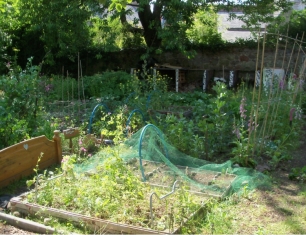Aberdeen Voice’s Old Susannah peers past the hot summer haze, smokescreens, and piles of unsold, undistributed P&Js and EEs to define the Deen’s dominant issues. By Suzanne Kelly.
Tally Ho! The big news this past week is John Swinney: he has come down firmly on the side of the City Gardens Project. Result!
I guess I must have missed the part where we had a sound business case and where we threw out the economist’s assessment of the TIF application; I really must pay more attention.
I’d also have thought that Swinney would need a little time to digest all the evidence – but most of the digestion he did was over ACSEF ‘working lunches’ (see below).
Also on the theme of Union Terrace Gardens, we have a few upstart independent councillors about to launch a different option for the city centre’s future before the crucial 22nd August vote.
Obviously there is only one solution, and that is the granite web to be put in place of the city’s green lungs. You couldn’t for instance build a civic square on the site of the fortress of doom, aka St Nicholas House – where’s the fun (or benefit to one Mr Milne) in that?
No, the only answer to permanent economic prosperity, permanent career creation, jobs for the (construction) boys and eternal bliss, is the granite web. Shame on those indies. Now if they were part of some of the major parties, they’d just do as they were told and be done with it.
Having said that, a news item tells me the SNP and the Lib Dems are fighting again; apparently over a boundary shake-up. The SNP wish to make the Lib Dems look bad. Personally, I think that horse has already bolted.
Before moving on to some timely definitions, I’d like to thank the people in charge of roads at Aberdeen City Council for getting rid of all those pesky wildflowers growing on Wellington Road. Yes, those gigantic pansies, daisies and other wildflowers have all been mowed over.
It’s good that there is no discrimination between 3 foot high grass and 3 inch high wildflowers – treat them all alike, I say. So if the bees get even less areas to feed on and if the remaining moths and butterflies are killed, no worries. Soon all will be covered in concrete anyway, so getting rid of the flowers before they went to seed is irrelevant.
The same anti-nature mentality must be at work in whichever department allows fireworks displays – HMT has been at it again. In case there were any wild animals left in UTG not already scared off by Milne’s anti peregrine falcon goons, or by the previous fireworks, a brilliant (?) display of daytime fireworks was set off last week.
Someone should tell the city that disturbing the bothersome yet protected by EU legislation animals (bats, birds, etc) is not supposed to happen.
Can we please go back to having fireworks at the beach, and perhaps at night time? Word has it that fireworks can be seen to be more vibrant and dynamic at night.
Silly Season: (Mod Eng Phrase)
Summer months during which there is a shortage of serious news stories and the media often resort to printing non-news stories, ‘cute’ items and/or tall tales.
Thankfully the ‘silly season’ is something our more serious newspapers are immune to. While the Evening Express may have endless photo competitions for adorable babies and so on, the mainstream press keeps its sombre, serious course.
Stories such as the 7th August P&J piece on a white witch performing a ritual to raise the Loch Ness Monster are demonstrative of the mindset of the newspaper which wants us to take its word over the best future use for Union Terrace Gardens.
This might seem like a textbook example of ‘silly season journalism’ to you, but I’m sure it’s actually a very important piece on comparative religion and marine biology. The mythical kelpie is apparently being used by some ‘creationist’ sects in the United States to prove that evolution is wrong and the bible is right about Adam and Eve. I guess the logic at play there is just a tad over my head.
Working Lunch: (Mod Eng Phrase)
To combine a social meal occasion with business and/or politics; a form of lobbying.
So – how did John Swinney get so interested in the future of our beloved Granite Web? It was over a working lunch. Or two. After all, it was over a few friendly dinners that Swinney’s higher up, Alex Salmond, met Donald Trump and was convinced that Trump’s needs outweighed Scotland’s only movable sand dune system (a SSI) and a few troublesome Scottish people. As above, so below.
Who took Swinney to lunch? Why ACSEF of course – including Colin Crosby (who is a director of Aberdeen City Gardens Trust along with Tom Smith) and Mr Stewart Milne (owner/developer of the adjacent Triple Kirks site). Any conflict of interest between what these entities stand to gain and their ACSEF roles? Never! . Here is a little taster of what was on the menu back in February, 2010:
“ACSEF Working Lunch with Cabinet Secretary John Swinney – 16 February [2010]
“The Chairman [Tom Smith] advised that the presentation to be made to John Swinney had been revised to take account of comments at the special Board meeting on 9 February. He ran through the format for the presentation and discussion and advised that Stewart Milne would raise the importance of delivery of infrastructure projects and aspirations for the future, Colin Crosby the desire for Government support for TIF’s and need for innovative thinking around funding methods and Dave Blackwood the importance of oil and gas relative to renewables and also its internationalisation.”
– from ACSEF Minutes
I’m sure that over a tasty meal, (although probably not at Nando’s, or Starbucks) Mr Milne and Mr Crosby must have left a clear impression that everyone in Aberdeen wants a granite web.
No doubt over the brandy and cigars the alternative points of view (if any) were also made clear and the importance of the EU protected trees and animals, the web’s probably carbon footprint and that little matter of where to find a spare £90,000,000 were put in perspective. We should thank all concerned for throwing this little lunch I say.
Who paid for any such working lunches? Why you and I did: ACSEF is publicly funded. Bon appétit!
Smokescreen: (noun; Eng)
Something that obscures or deflects attention away from another thing in an attempt to mislead, or confuse.
The previous administration made lots of noise about its ‘transparency’ – but most of us saw straight through that.
Callum McCaig has accused the independent councillors of putting up a smokescreen. McCaig seems to imply that the Indies’ belief in a possible alternative to the Granite Web is just a smokescreen.
Old Susannah has sought local examples of smokescreens to help define this tricky term. There is, for example, the noble attempt by Council employees who served up smoked deer. Anonymous ACC operatives gave an ACC letter to the P&J, which became a news story claiming that ‘two deer were found dead ahead of the (Tullos Hill) cull’.
The implication was that the deer were suffering and dying (which all relevant animal charities hotly contested) and shooting the deer dead would help them (a concept I’m still working on). This story might have successfully deflected attention away from the other issues (there are many), but alas the attempted smokescreen failed.
The deer did die in advance of the cull all right – two years in advance in fact (and of causes unknown). Deer live about 6-7 years and do actually die, believe it or not. Smokescreen FAIL.
Searching for further whiffs of smoke, I must thank Mr Tom Smith (of ACSEF, the Aberdeen City Gardens Trust, etc. etc.) for providing me with a recent example.
Just before the referendum (coincidentally), he was on the front page of the P&J with the sad story that he had been the victim of illegal computer hacking as well as harassment. Tom put the blame for this clearly illegal hacking activity on those who wanted UTG left without a web.
This apparent victimisation of Tom created sympathetic feelings for him (didn’t we all feel his pain?), just in time for the referendum. Is there any chance that this allegation of crime being committed against poor Tom, coming to light just before the referendum as it did, could have been a smokescreen?
A smokescreen might have been useful to sway the vote, deflect attention away from other issues such as the actions of the ‘unofficial’ pro web group, which was free to publish what it wanted and spend as much as it pleased, operating outside of the referendum’s limits ? Surely not.
There must have been hard, cold, direct evidence proving Smith had been hacked. Otherwise the Press & Journal would not have run such a story, just like they wouldn’t publish a news story about a kelpie and a white witch without concrete evidence. Yet when I asked Smith, ACSEF and the police for details of the crime committed, I was told it was ‘private’. Funny, how this public story quickly went private; just one of those things I guess.
Sadly, Mr Smith, Chair of ACSEF, may be able to influence how public money is spent – but the public are not permitted to send him emails directly. The public must instead email Rita Stephen of ACC, who acts as intermediary. Ms Stephen explains that Mr Smith’s email address is ‘personal data’.
I never did find out how a publicly-funded body like ACSEF would have its members’ emails protected by the Data Protection Act.
I had written for info on the allegations of illegal hacking of Smith’s emails. I eventually received a reply concerning anonymous letters and something to do with pornographic pictures on social network sites (did any of you know there were naughty pictures on the internet?).
Did I get a response to my direct question about email hacking crime? No. It was almost as if Mr Smith’s reply to me was a smokescreen covering up the smokescreen of the P&J article alleging a crime.
Shockingly, it seems no illegal hacking has taken place. I don’t find anything in any subsequent P&J articles on the matter and I can’t find court publications to say anyone had been charged with email hacking. This crime could carry a custodial sentence and/or a fine (under Computer Misuse legislation).
I think the smoke is clearing. Should Mr Smith get in touch now to say exactly who was charged with what hacking crime, I’ll get back to you. But it’s starting to look like some small exaggeration took place with conveniently strategic timing.
One last thought; the smoke may clear completely in the near future. Audit Scotland has been asked to look at some of the financial intricacies of the interesting way in which work is commissioned, invoiced and then paid for regarding our sparkly granite web.
Audit Scotland may not prove so easy to put off and they seem more than a little interested.
- Comments enabled – see comments box below. Note, all comments will be moderated.





